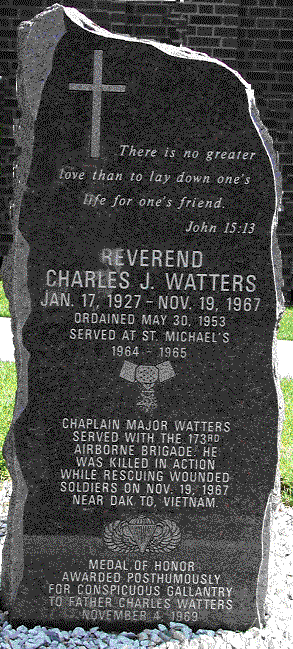Welcome to the Cranford Historic Preservation Advisory Board Website
Chaplain Major Charles Watters
Born in Jersey City, January 17, 1927, Charles Joseph Watters graduated from Seton Hall Preparatory School, and then Seton Hall University. He was ordained a Catholic priest on May 30, 1953. From 1964 - 1965, Father Watters served at St. Michael's Church in Cranford - his Cranford connection.
An active pilot, in 1962 he became a chaplain in the Air National Guard, and in 1964 he entered active duty as an Army chaplain. In July, 1966, Chaplain Watters began a 12-month tour of duty in Vietnam with the 173rd Airborne Brigade. In July, 1967, he extended his tour for an additional 6-months. Major Watters died on November 19, 1967 while tending the wounded during a 12-day battle in the vicinity of Dak To. He is buried in Arlington National Cemetery.
One of only and handful of chaplains to receive the Congressional Medal of Honor - our country's highest military decoration -Major Watters' citation reads:
"For conspicuous gallantry and intrepidity in action at the risk of his life above and beyond the call of duty. Chaplain Watters distinguished himself during an assault in the vicinity of Dak To. Chaplain Watters was moving with one of the companies when it engaged a heavily armed enemy battalion. As the battle raged and the casualties mounted, Chaplain Watters, with complete disregard for his safety, rushed forward to the line of contact. Unarmed and completely exposed, he moved among, as well as in front of the advancing troops, giving aid to the wounded, assisting in their evacuation, giving words of encouragement, and administering the last rites to the dying. When a wounded paratrooper was standing in shock in front of the assaulting forces, Chaplain Watters ran forward, picked the man up on his shoulders and carried him to safety. As the troopers battled the first enemy entrenchment, Chaplain Watters ran through the intense enemy fire to the front of the entrenchment to aid a fallen comrade. A short time later, the paratroopers pulled back in preparation for a second assault. Chaplain Watters exposed himself to both friendly and enemy fire between the two forces in order to recover two wounded soldiers. Later, when the battalion was forced to pull back into a perimeter, Chaplain Watters noticed that several wounded soldiers were lying outside the newly formed perimeter. Without hesitation and ignoring attempts to restrain him, Chaplain Watters left the perimeter three times in the face of small arms, automatic weapons, and mortar fire to carry and to assist the injured troopers to safety. Satisfied that all the wounded were inside the perimeter, he began aiding the medics … applying field bandages to open wounds, obtaining and serving food and water, giving spiritual and mental strength and comfort. During his ministering, he moved out to the perimeter from position to position redistributing food and water, and tending to the needs of his men. Chaplain Watters was giving aid to the wounded when he himself was mortally wounded. Chaplain Watters' unyielding perseverance and selfless devotion to his comrades was in keeping with the highest traditions of the U.S. Army."
The name Charles Joseph Watters is inscribed on the Vietnam Veterans Memorial on Panel 30E, Row 036. The congregation of St. Michael's has placed the following memorial in front of the church.

